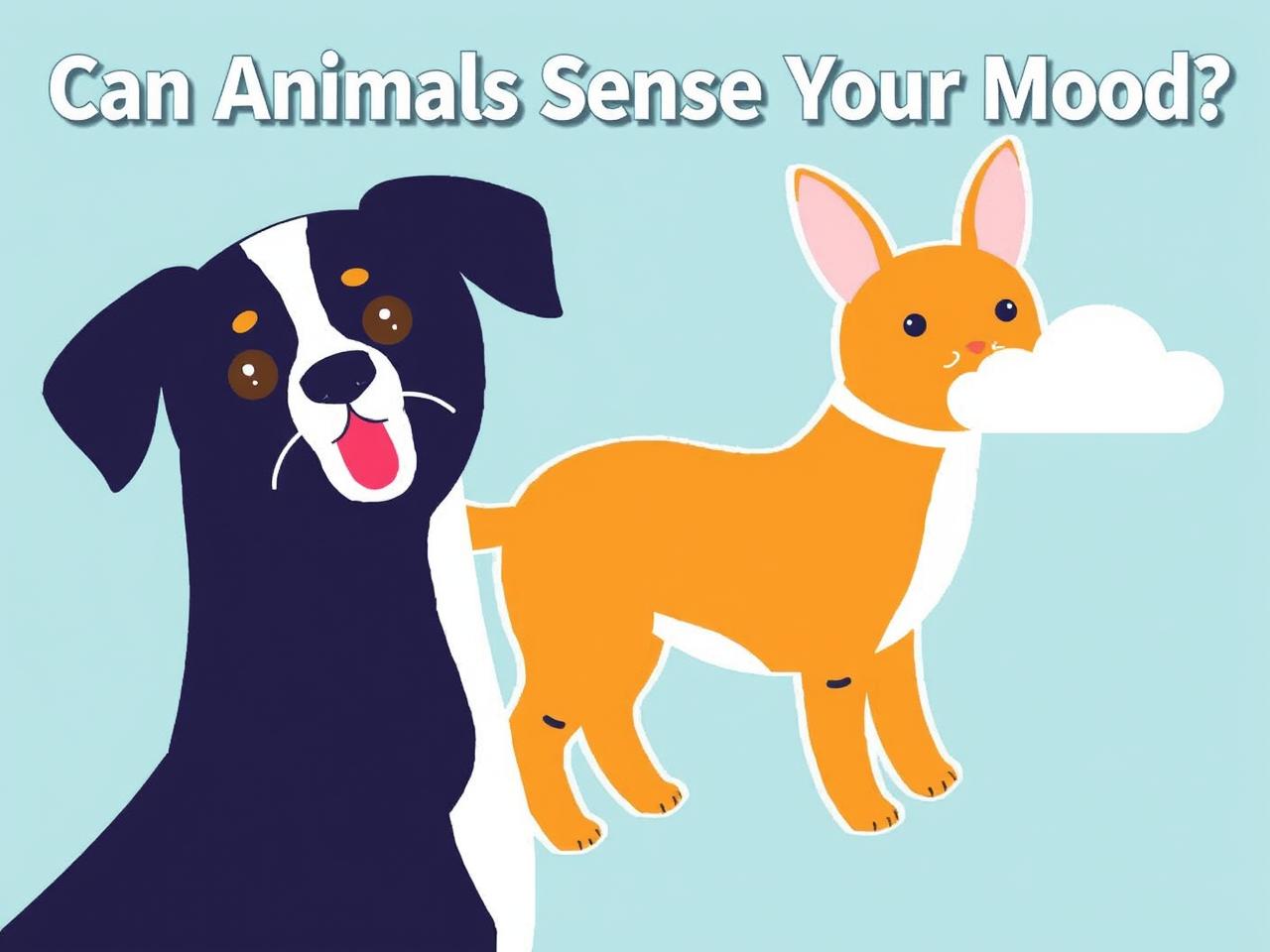Can Animals Sense Your Mood? Exploring Emotional Connections with Pets
Animals possess the capacity to experience a diverse range of emotions, similar to humans. The scientific study of animal emotions is a complex and extensively researched field. Evidence suggests that both domesticated and wild animals can feel emotions such as joy, fear, anger, and affection.
This emotional capacity is attributed to the complex nervous systems and brain structures found in animals, which are responsible for processing emotions. Mammals, including dogs and cats, share similar brain structures with humans, such as the amygdala and prefrontal cortex. These structures play crucial roles in emotional processing and decision-making.
Consequently, animals can experience emotions in ways that are comparable to human emotional experiences. Research has also demonstrated that animals produce hormones and neurotransmitters associated with human emotions. For example, oxytocin, often referred to as the “love hormone,” is produced by both humans and animals during moments of bonding and social interaction.
Similarly, animals produce stress hormones like cortisol when experiencing distress or fear. These biological and neurological similarities between humans and animals indicate that animals possess the capacity to experience a wide spectrum of emotions. The scientific understanding of animal emotions highlights the significant parallels between human and animal emotional experiences, revealing the depth and complexity of animal emotional lives.
Key Takeaways
- Animals experience a range of emotions, including joy, fear, and sadness, similar to humans.
- Animals can pick up on human emotions through body language, tone of voice, and scent cues.
- Emotional connections with pets can lead to reduced stress, increased happiness, and improved mental well-being for humans.
- Signs that your pet can sense your mood include changes in behavior, seeking comfort, and offering support.
- Strengthening the emotional bond with your pet can be achieved through regular play, positive reinforcement, and quality time spent together.
How Animals Pick Up on Human Emotions

Reading Human Cues
For example, dogs are known for their exceptional ability to read human body language and facial expressions. They can detect changes in their owner’s posture, tone of voice, and facial expressions, which enables them to understand their owner’s emotional state. Similarly, cats are also adept at picking up on human emotions, often responding to their owner’s mood with affection or by providing comfort.
Picking Up on Subtle Cues
Furthermore, animals can also pick up on more subtle cues, such as changes in scent and pheromones that are released when humans experience different emotions. This heightened sensitivity to human emotions is likely a result of the strong bond and social connection that animals share with humans.
The Depth of Emotional Intelligence
In the wild, animals rely on social cues and communication to navigate their environment and form social bonds within their own species. This ability to pick up on human emotions not only allows animals to respond to their owner’s needs but also strengthens the emotional connection between humans and their pets. Overall, the remarkable ability of animals to pick up on human emotions demonstrates the depth of their emotional intelligence and their capacity for empathy.
The Benefits of Emotional Connections with Pets

The emotional connection between humans and their pets has numerous benefits for both parties involved. Research has shown that owning a pet can have a positive impact on mental health, reducing stress, anxiety, and depression. The emotional bond between humans and their pets provides a source of comfort and companionship, which can help alleviate feelings of loneliness and isolation.
Additionally, the presence of a pet can also promote a sense of purpose and routine in a person’s life, as they are responsible for the care and well-being of their animal companion. Moreover, the emotional connection with a pet can also have physical health benefits. Studies have found that owning a pet is associated with lower blood pressure, reduced risk of heart disease, and improved overall health.
The act of caring for a pet, such as walking a dog or playing with a cat, can also encourage physical activity and exercise. Furthermore, the emotional bond with a pet can provide a sense of security and safety for individuals, particularly those living alone. Overall, the emotional connection with a pet has far-reaching benefits for both mental and physical well-being, highlighting the profound impact that animals can have on human lives.
Signs Your Pet Can Sense Your Mood
Pets have an uncanny ability to sense their owner’s mood and emotional state. There are several signs that indicate your pet can pick up on your mood and respond accordingly. One common sign is changes in your pet’s behavior when you are feeling upset or stressed.
For example, dogs may become more attentive and affectionate when they sense their owner is feeling down, often offering comfort through physical contact or by staying close by. Similarly, cats may exhibit more soothing behaviors, such as purring or gentle nudging, in response to their owner’s distress. Another sign that your pet can sense your mood is their ability to mirror your emotions.
Pets often reflect their owner’s emotional state through their own behavior and body language. For instance, if you are feeling anxious or agitated, your pet may exhibit signs of restlessness or unease. On the other hand, if you are feeling calm and content, your pet may also appear relaxed and contented.
Additionally, some pets may vocalize or communicate in specific ways in response to their owner’s mood, such as barking or meowing more frequently when they sense their owner is upset. These signs all point to the remarkable ability of pets to pick up on their owner’s emotions and respond in kind, demonstrating the depth of the emotional bond between humans and their animal companions.
Ways to Strengthen the Emotional Bond with Your Pet
There are several ways to strengthen the emotional bond with your pet and enhance your relationship with them. One effective way is through positive reinforcement and reward-based training. By using treats, praise, and affection as rewards for good behavior, you can build trust and strengthen the bond between you and your pet.
This positive reinforcement creates a positive association with you as their owner and encourages a deeper emotional connection. Another way to strengthen the emotional bond with your pet is through regular physical activity and playtime. Engaging in interactive play with your pet not only provides physical exercise but also fosters a sense of fun and enjoyment in your relationship.
This shared activity can create positive experiences and memories that contribute to a strong emotional bond. Additionally, spending quality time with your pet is essential for building a strong emotional connection. Whether it’s cuddling on the couch, going for walks together, or simply being present in the same space, dedicating time to be with your pet strengthens the bond between you.
Furthermore, providing consistent care and meeting your pet’s needs demonstrates your commitment and reliability as their caregiver, which deepens the emotional connection between you and your pet.
The Role of Body Language in Animal Communication
Decoding Animal Body Language
For instance, a dog wagging its tail is often interpreted as a sign of happiness or excitement, while flattened ears may indicate fear or submission. Similarly, cats use subtle body language cues such as tail position and ear movements to express their emotions and intentions.
Animals Reading Human Body Language
Furthermore, animals are highly attuned to human body language and can interpret our gestures and expressions to understand our emotions and intentions. This ability to read human body language allows animals to respond appropriately to our moods and needs.
Building a Strong Bond with Your Pet
Understanding animal body language is essential for effective communication and building a strong emotional bond with your pet. By learning to interpret your pet’s body language cues, you can better understand their emotions and needs, leading to improved communication and a deeper connection with your animal companion.
Understanding the Limits of Animal Emotion Sensing
While animals have an impressive ability to pick up on human emotions, it’s important to understand the limits of their emotion sensing capabilities. Animals may not always accurately interpret human emotions or intentions due to differences in species-specific communication styles and social cues. For example, a dog may misinterpret a human’s raised voice as anger when in fact it is simply excitement or enthusiasm.
Additionally, individual differences in animal behavior and personality can also impact their ability to sense human emotions. Some pets may be more attuned to human emotions than others based on their breed, temperament, or past experiences. It’s important to recognize that not all animals will respond in the same way or demonstrate the same level of sensitivity to human emotions.
Furthermore, while animals can sense human emotions to some extent, they may not possess the same level of cognitive understanding or empathy as humans. While they can respond empathetically to our emotions through comforting behaviors or affectionate gestures, it’s essential to remember that their understanding of human emotions is limited by their own cognitive abilities. In conclusion, while animals possess remarkable abilities to sense human emotions and form strong emotional bonds with their owners, it’s important to recognize the limitations of their emotion sensing capabilities.
Understanding these limits can help foster realistic expectations for our relationships with our pets while appreciating the depth of their emotional intelligence and capacity for empathy.
FAQs
What is the emotional connection between animals and humans?
Animals and humans can form strong emotional connections through companionship, trust, and mutual understanding. This bond can lead to animals being able to sense and respond to human emotions.
Can animals really sense human emotions?
Yes, research has shown that animals, especially pets like dogs and cats, can pick up on human emotions through body language, tone of voice, and scent. They can often sense when their owners are happy, sad, or stressed.
How do animals respond to human emotions?
Animals can respond to human emotions in various ways, such as offering comfort, seeking attention, or displaying their own emotions in response. For example, a dog may try to comfort a sad or anxious owner by staying close and offering physical affection.
What are some signs that animals can sense human emotions?
Signs that animals can sense human emotions include changes in their behavior, such as becoming more attentive or affectionate when their owner is upset, or avoiding them when they are angry or stressed.
Can animals help improve human moods and emotions?
Yes, studies have shown that interacting with animals, such as petting a dog or playing with a cat, can help reduce stress, anxiety, and depression in humans. This is often attributed to the emotional connection and bond between humans and their pets.







